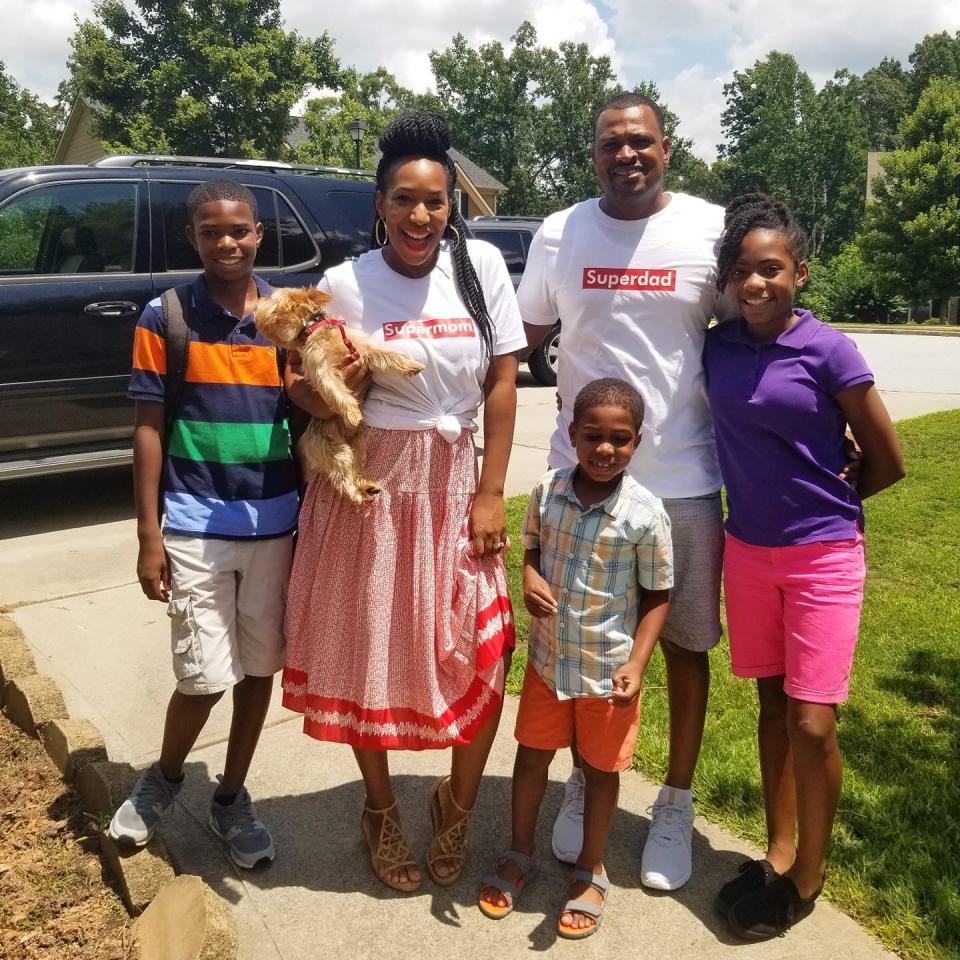How Black Families are Generating Wealth for the Next Generation

Getty Images.
Growing up, I'd often hear my dad and stepmom argue over my father's frivolous spending habits. Eventually my stepmother grew tired of receiving overdue notices for bills and paying late payment fees. When a luxury car my dad insisted she co-sign for was repossessed, my stepmom walked away from the marriage. And then our family home was foreclosed.
For years afterwards, my stepmother consistently talked to my sister and me about generational wealth. She was disappointed to not be able to pass the house down to us, but she still planted several seeds to start the growth of generational wealth for my sister and me. She also left us a modest inheritance that has been instrumental in helping us to kick off our own journey towards building wealth for our family's future; my sister, for one, used her inheritance to purchase a house. The funds my stepmother left helped her to fulfill the goal of homeownership years ahead of her plans.
"So many of us basically had to start at zero," Bernetta Knighten, founder of the non-profit The Knighten Project, explains to Parents. She adds that "generational wealth gives our family a head-start financially in life, so they can reach their dreams quicker and make a bigger image in this world." My stepmother understood this assignment.

Bernetta Knighten and family.
For most of us, home ownership is integral to building long lasting familial wealth. Unfortunately, many Black families have been held back in this country from that opportunity due to racist practices such as redlining, as well as predatory and biased loans. According to the US Census Bureau, the Black homeownership rate was 45.1% in the first quarter of 2021 compared to 73.8% of white households. Despite that setback, Black folks are still working hard to get into homes.
My husband and I bought a house for our family earlier this year. We live in one of the most expensive cities in the country, and real estate prices are outrageous. Even though we had a sweet situation with our rent-controlled leased home in a good neighborhood that allowed us to save a lot, we knew that our monthly rent payments weren't doing anything to sow into our family's legacy. We wanted to make sure we were starting to build equity so that our children can benefit in the future.
The Black home ownership rate was 45.1% in the first quarter of 2021, compared to 73.8% of white households.
I would be remiss if I didn't share that my in-laws helped us financially with our down payment. My husband and I saved for years to be able to afford our house, and we are so grateful for his parents who wanted to help us get into a home faster. My in-laws, like my stepmother before them, understood the assignment.
And what is that assignment? Well, it's lifting our children up and helping to build a financial foundation that will last long after we're gone.
About Generational Wealth
Celena Gill, a Black mother and entrepreneur, shares one of the most clear definitions of generational wealth that I've heard. She tells Parents that "generational wealth is recurring and consistent revenue that persists and lives on at least three generations beyond yourself."
And why is building generational wealth so important to Gill? "As an African-American," she explains, "my ancestors were denied opportunities to plant the seeds for generational wealth. We've developed wealth only to have it taken away by systemic racism or outright discrimination through intimidation and violence."

Celena Gill Celena Gill and family.
How to Build Generational Wealth in Your Family
Of course, investing in a family home is just one of the many ways that Black families like Knighten's and Gill's are creating wealth. Here are some more ideas to get you started.
Set up a family budget
Sound daunting? It's not. Here are some simple steps to make—and stick to—a family budget, so you can cut your spending and get to saving (and investing) for your family's future.
Save for your own retirement
It's crucial that parents save for their own retirement—so that their kids don't get stuck bankrolling their parents' old age instead of paying it forward. And yes, you can save for your retirement and your kids' college at the same time.
Invest better
Investing (whether in art, real estate, the stock market, or even NFTs) is another great way that folks in the Black communities are cultivating long-term financial goals.
"My husband and I are in a real estate investment group with 25 other entrepreneurs," Knighten shares. "We bought our first 19 properties this past March. Our goal is to continue investing with the group, but also buy our own properties. I'm a student of trading and learning to master the craft of stocks, options, and futures. Then I'll teach my own children how to make money outside of a job or business."
RELATED: The Family Home-Buying Guide
Teach your children about money—early.
"It's important to learn about the power of money from a young age," Knighten explains. The younger you can learn how money and credit works, the easier it will be as you grow to make these things work for you. Here are some great children's books to teach kids—from kindergarten through high school—money fundamentals.
Start a business.
Celena Gill, along with her husband, helped her three sons start a successful candle company, Frères Branchiaux Candle Company. "We started our candle business with $200 and have grown it into a seven-figure company in the span of three years," Gill explains. "We launched a business to build generational wealth, provide local employment opportunities, and support the community through philanthropy."
Having your own business, while not an easy answer to wealth-building, does open up the opportunity for you to earn more. As opposed to receiving a set salary from a 9-5 job regardless of your output, your earning potential is limitless when you work for yourself. Often, when you're self-employed, the more you work, the more you earn. Then you can take those funds and invest in your future.
Limit your debt.
I know, we just suggested that purchasing a (usually mortgaged) home is a great way to build generational wealth, and now we're saying to limit debt. But both can be true at the same time; there is such thing as good debt.
Credit card debt, or making payments on things that have rapidly depreciating values (such as cars or clothing), doesn't help the goal of growing wealth; getting a mortgage does. Buying a house builds equity; racking up credit card bills to afford that brand-new car or expensive pair of shoes, on the other hand, "keeps you in bondage for years paying thousands more for something that isn't worth it," Knighton explains. "Many people don't save or invest because they are paying their debt" instead, she adds.
Will Black families ever be able to recoup the wealth we missed out on while being held back by racism, discrimination, and bias? Not for a long while. But that's not going to stop us from continuing to move forward and creating the future that our future generations deserve.

